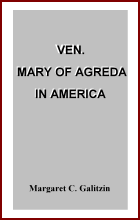Faith under Attack
 |
 |
 |
 |
 |
 |
 |
WYD 2023 – Part II
A Progressivist ‘Catechism’
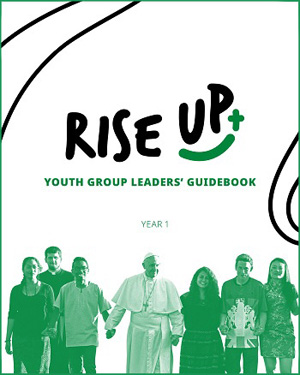
The cover of the 2-year WYD 2023 guidebook
- The two-year pre-WYD “Catechesis”;
- The three-month “Rise Up Encounters” leading up to WYD;
- The in-app “Examination of Conscience.”
Pre-WYD ‘rise up’ catechesis
To lead up to the actual event in August of 2023, the WYD Pastoral and Central Events Directorate prepared a Protestant-style two-year “catechesis” named Rise Up (the WYD theme). Made by the Portuguese Salesians (see p. 2), the catechesis has 9 lessons, accompanied by a Leader’s Guidebook.
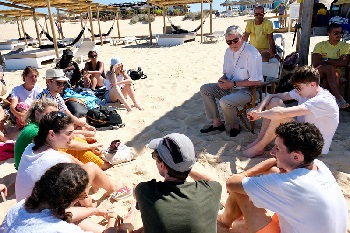
Immodestly dressed youth learning at the beach
These questions include “How might God be speaking to me through these deep desires that I discover within me?” ( p. 22), and “Is Mary an influencer for you?” (p. 19). Each lesson is accompanied by childish drawings, Protestant-style songs, and vague excerpts from the progressivist Catechism of the Catholic Church (CCC).
Even the word “Catholic” is never mentioned in the 95 pages of the Leader’s Guidebook, except when referencing the CCC. The catechesis opts instead for words and phrases like “Christian” and “community of the Church.” The aim of the catechesis is not to make youth Catholic, but rather “missionary disciples” (p. 6) with “human virtues” and who will “transform service in the world” (p. 4).
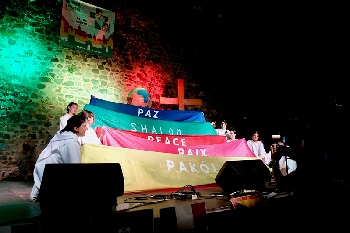
A pacifist ambience - Diocese of Beja welcomes pilgrims before WYD, taken from WYD’s official site
The Guidebook also presents a distorted Fatima message. It affirms that the message of Our Lady at Fatima was “a message for all mankind” of “personal conversion” and “the promotion of peace in the world” (p. 92). Nowhere does it explain what this “personal conversion” consists of.
Neither does it mention that Our Lady promised peace on the conditions that 1) Russia be consecrated to her Immaculate Heart by the Pope in union with all of the Bishops, 2) men convert to the Catholic Church and do penance for offending God. She also asked that Catholics complete the 5 First Saturdays devotion, which has been ignored by the Vatican II Popes.
Another grave omission in the presentation of the Fatima message is that Our Lady warned that God would send a chastisement if men did not heed her commands.
The Rosary is only mentioned in connection to this new peace-centered Fatima message, and to ask for prayers for the “entire Christian community” (p. 43), encouraging ecumenism with Protestants This would seem to coincide with the idea of the “anonymous Christians” of Council perito Karl Rahner – almost all are already “Christian” without realizing it.
There are some phrases and sections that could even induce youth to accept global Socialism. One section mentions how WYD is only possible with the financial contributions of individuals and States, which it calls “active participation” (p. 45). This idea tendentially induces a youth to accept the idea of a global Socialism, such as that being pushed by Pope Francis. (2)
Earth-worship & universal fraternity
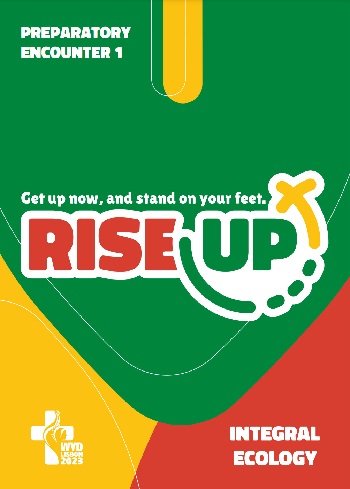
The first encounter, Integral Ecology, followed Laudato si; the second, called Social Friendship, was based on Fratelli tutti; the third, called The Great Message of God’s Love, studied Christus vivit and the Pope’s Message for the 27th World Youth Day.
Each encounter was meant to instill a certain progressivist doctrine into the youth, who were then invited to fill out a survey and send in their conclusions, in the spirit of democracy or “synodality.” The document states that “these themes are essential in Pope Francis’ magisterium," which implies that Francis’ “magisterium” is different from that of his predecessors, particularly the pre-conciliar Popes...
In the first encounter “Integral Ecology,” youth were not invited to contemplate the dogmas of the Faith and their eternal salvation, as a traditional catechesis would do; instead they were instructed to consider the bad consequences of pollution and climate change, and to bewail the “broad spectrum of health hazards” that cause “premature death” (p. 7). Youth were also taught to exploit the issue of water access as a “universal human right” and use it in the communist spirit of class struggle (p.8).
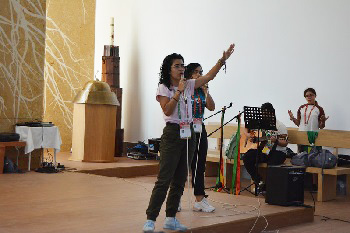
A Protestant-style worship at a Rise Up meeting in Charneca da Caparica
The third encounter, “The Great Message of God’s Love,” was focused on “individual reflection and prayer” (p. 4). After presenting excerpts from Francis’ Message for the previous WYD, it ends with a “small group sharing” on “the joy of welcoming Jesus.” It finishes with Adoration of the Blessed Sacrament, which offers imaginary words of Our Lord saying trite phrases, such as “It’s precisely through your contradictions, weaknesses and meanness that I want to write a love story with you” (p. 13).
The musical suggestions for this Adoration of the Blessed Sacrament were ecumenical Taizé songs interspersed with “silence and chanting” (p. 13). What kind of chanting this is meant to be is not explained in the text.
In short, the Vatican’s catechesis for youth presents a group-centered, vague and subjective “faith” based on ecology and social “justice,” universal fraternity and ecumenism.
We see the immense difference between this “catechesis” and what was traditionally taught in catechisms of the Church. The latter comprised a crystal clear list of dogmas in which we must believe in order to be Catholic (see the Baltimore Catechism here). The progressivist catechesis, in turn, is vague, ecology and social justice-centered, focused on feelings and personal interpretation.
Undermining Catholic catechesis
What is the doctrine behind this new catechesis, and why is it so opposed to the Faith? In Volume 6 of his Collection, Inveniet Fidem - Will He Find Faith?, Atila Guimarães explains that this progressivist conception of the Faith was pushed by the conciliar periti of Vatican II, and is latent in its documents.
According to the traditional teaching of the Catholic Church, “the Faith is formed by an ensemble of objective and absolute truths that we must believe because they were revealed by God.” (3) For these reasons, “the Faith is objective, absolute, abstract, fixed and one.” (4)
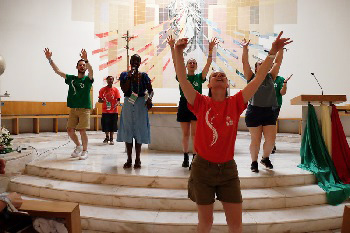
A new religion preached to the youth.
Above, a Rise Up Meeting in Alfragide,
taken from WYD’s
This progressivist concept bases itself on the idea that Revelation is immanent in men and that each man has divine latencies or “individual revelations” (6) that must be discovered, believed in as truth, and brought to the community for consideration.
Thus, the progressivist concept is that Faith is not objective, but subjective; not absolute, but relative; not universal and abstract, but particular and adaptable to history.
This is why the WYD’s catechesis refuses to present dogma to the youth, but prefers to encourage relativism via universal fraternity, personal interpretation and self-discovery. One can see that this concept is radically opposed to the traditional teaching of the Catholic Faith.
I can only hope that this article will help wake up Catholics to the reality that the Church has been infiltrated by progressivists, who took control of the Church in Vatican Council II, and who are now indoctrinating our youth with a new religion, called Progressivism.
Continued
- On page 88: “Otherwise, the leader must give a brief explanation of the nature of sin, which fights inside us against God, and the need to abandon a sinful path to enter the kingdom of God, as well as the importance of the examination of conscience in order to grow in this path.”
- On p. 45 - “The leader must question the youth if the business world can be a place where God passes by? .... A WYD is only possible if there is active participation by the States, participation by enterprises and companies etc.”
- p. 17.
- p. 19
- p. 18
- p. 20.

Posted October 4, 2023
______________________
______________________



